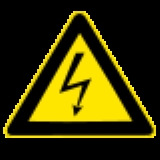
Voltage
Overview
Joule
The joule ; symbol J) is a derived unit of energy or work in the International System of Units. It is equal to the energy expended in applying a force of one newton through a distance of one metre , or in passing an electric current of one ampere through a resistance of one ohm for one second...
per coulomb) is the difference in electric potential
Electric potential
In classical electromagnetism, the electric potential at a point within a defined space is equal to the electric potential energy at that location divided by the charge there...
between two points — or the difference in electric potential energy
Electric potential energy
Electric potential energy, or electrostatic potential energy, is a potential energy that results from conservative Coulomb forces and is associated with the configuration of a particular set of point charges within a defined system...
per unit charge between two points. Voltage is equal to the work
Work
Work may refer to:Human labor:* Employment* House work* Labor , measure of the work done by human beings* Manual labor, physical work done by people* Wage labor, in which a worker sells their labor and an employer buys it...
which would have to be done, per unit charge, against a static electric field
Electric field
In physics, an electric field surrounds electrically charged particles and time-varying magnetic fields. The electric field depicts the force exerted on other electrically charged objects by the electrically charged particle the field is surrounding...
to move the charge between two points.
Unanswered Questions

